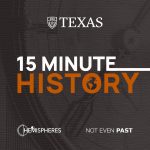Debt is a human constant. The social implications of systems of credit and debt, however, are not; they can vary significantly over time and space. Traveling freely across the human past, this paper explores the paradoxical nature of the borrowing and lending and provides signposts for writing the natural history of debt.
Daniel Lord Smail is Frank B. Baird, Jr. Professor of History at Harvard University, where he works on the history and anthropology of Mediterranean societies between 1100 and 1600 and on deep human history. In medieval European history, his work has explored the social and cultural history of the cities of Mediterranean Europe, with a focus on Marseille in the later Middle Ages. He has covered subjects ranging from women and Jews to legal history and spatial imagination, which was the subject of his first book, Imaginary Cartographies: Possession and Identity in Late Medieval Marseille (Cornell University Press, 1999). His recently published book, Legal Plunder: Households and Debt Collection in Late Medieval Europe (Harvard University Press, 2016), approaches transformations in the material culture of the later Middle Ages using household inventories and inventories of debt recovery from Lucca and Marseille. Smail’s work in deep history and neurohistory has addressed some of the methodological and theoretical underpinnings of these approaches to the human past. His most recent article in this vein asks whether there is a history of the practice of compulsive hoarding. His books include The Consumption of Justice: Emotions, Publicity, and Legal Culture in Marseille, 1264-1423 (Cornell University Press, 2003); On Deep History and the Brain (University of California Press, 2008), and, with Andrew Shryock and others, Deep History: The Architecture of Past and Present (University of California Press, 2011).
Smail has received awards and fellowships from the National Endowment for the Humanities, the American Council of Learned Societies, the Guggenheim Foundation, the Radcliffe Institute for Advanced Study, and the Institute for Advanced Studies in Princeton, and his publications have received several prizes. In 2007, he received the Joseph R. Levenson Memorial Teaching Prize from the undergraduates of Harvard University, and, in 2014, the Everett Mendelsohn Excellence in Mentoring Award from the Graduate School of Arts and Sciences.
“Reclaiming the Pre-Modern Past” is an IHS lecture series that examines how new technologies and approaches are enriching our understanding of pre-modern eras and cultures
Other IHS Talks:
Climate and Soil: The Environmental History of the Maya
The Influenza Pandemic of 1918-1919
The views and opinions expressed in this article or video are those of the individual author(s) or presenter(s) and do not necessarily reflect the policy or views of the editors at Not Even Past, the UT Department of History, the University of Texas at Austin, or the UT System Board of Regents. Not Even Past is an online public history magazine rather than a peer-reviewed academic journal. While we make efforts to ensure that factual information in articles was obtained from reliable sources, Not Even Past is not responsible for any errors or omissions.



